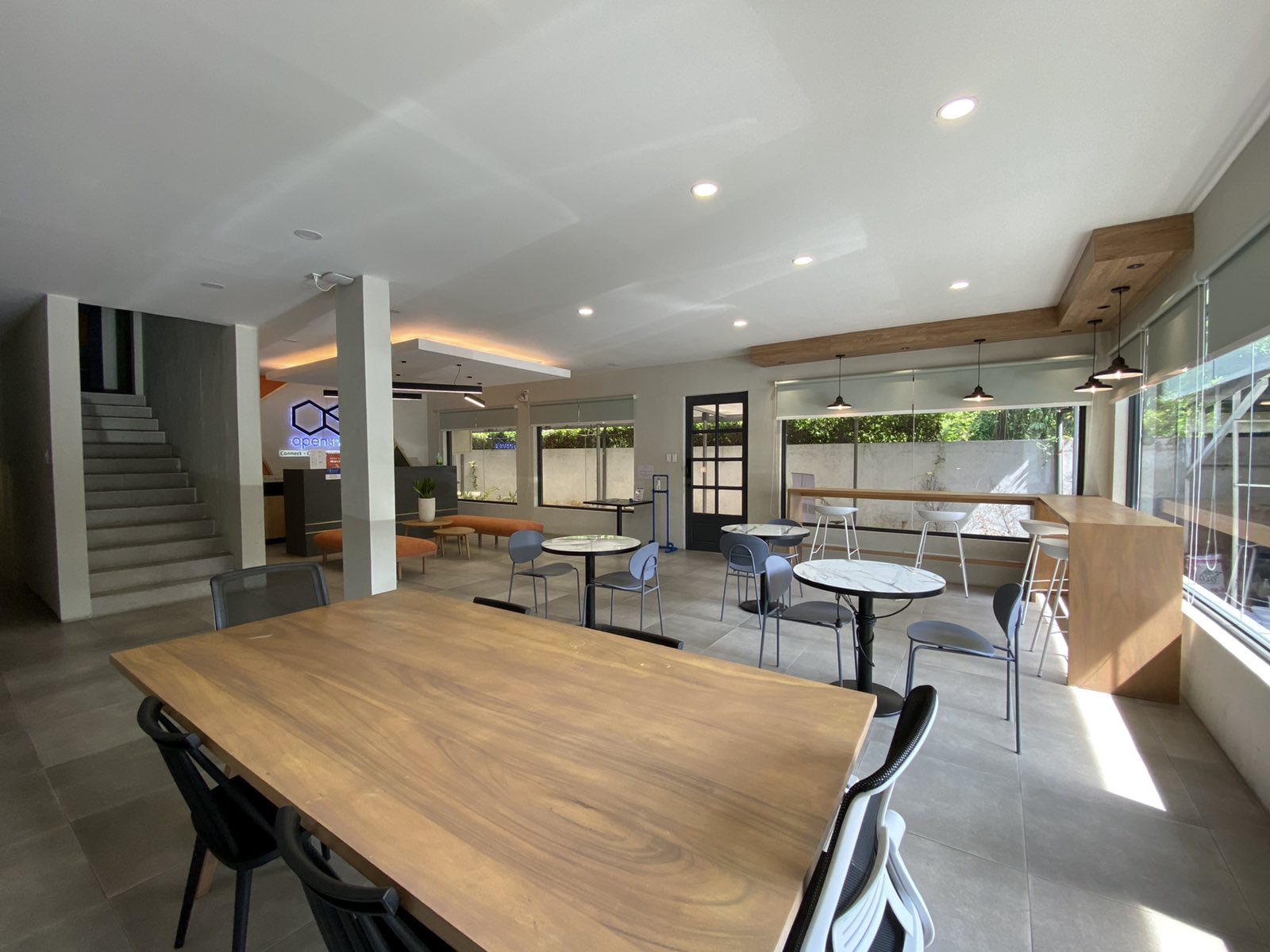From afternoons to early evenings, like a scene at weekend bazaars, curious ones crowd into a parking lot along Esteban Abada Street in Loyola Heights, Quezon City to enjoy food al fresco. The lot finds itself in the middle of tiny stalls: One selling takoyaki just a turn away from the sidewalk, a stall preparing Malaysian street food next, and another grilling chicken inasal farther in. On the other side, a plant shop brims with all things that thrill hobbyists.
The main site, however, is a relatively new co-working space that owns the entire property and accommodates these small businesses—all while serving its original purpose.
Openspace is a community hub that takes “connecting people under one roof” a notch higher. Beyond offering rooms and spaces of various sizes and purposes, its open-air, drive-in market idea is part of its response to the limitations and difficulties the crisis has inflicted the past year. Not only does Openspace provide clients with well-lit, conducive spaces that make up the sizeable property, it also bridges residents and MSMEs, whose sense of place within their own community has seemingly been sidelined in a globalized society.
(Re)opening the space
With various residences, dining sites, and other commercial recreational shops curling into the neighborhood streets, pre-pandemic Loyola Heights could be considered a small but steady lifestyle hub.
But that all quickly changed once the pandemic hit the Philippines in March 2020. Worse, QC was one of the country’s COVID-19 hotspots, forcing closures here and there. In this climate where the neighborhood’s once-bustling streets turned hollow, small shops and local markets would fill those spaces that had unfortunately emptied.
“In times of drastic change, we needed to do drastic actions,” Joe Sevilla says. “The Bazaar was one of them, paving the way for small businesses to give it a shot for less and giving the community a safer and carefully [thought-out] system to drive in, eat, and have fun.”
Openspace inevitably found themselves, too, in this problematic transition. Launched in mid-2019, this all-in-one establishment had yet to reach its first year in business when the crisis struck. Its original concept included being a venue for media outfits, content creators, gamers, and musicians —a venture that almost always entailed high production value and a big crew. With a business idea highly dependent on foot traffic, the brand was on the bleaker side of things.
“The pandemic was very difficult for us, just like with other companies who were badly hit by the situation… [We] are in a leasing industry that can only thrive by the number of people or foot traffic going in and out of the area,” relates Openspace president Joe Sevilla.
Building a bazaar
In keeping a business alive, opening oneself to change is one thing. Acting on it is another.
While already “open” and innovative as a multipurpose property, Openspace still had to adapt to a pandemic-plagued situation no one was truly prepared for. In order to survive quarantine rules that would sporadically halt business operations, Sevilla and his team had to shift quickly.
“We had to find a way to pivot our business where we can still operate as an entity and limit the expenses as much as we could, as fast as we could. We were able to cope with the situation by thinking fast, acting quickly, and improving what needs to be changed or addressed along the way,” Sevilla says.


Promoting the drive-in market called Openspace Bazaar became the brand’s first huge step. The bazaar basically utilized the lot just across the space, allowing smaller entrepreneurs to lease it for a renewable standard contract of one year.
“In times of drastic change, we needed to do drastic actions,” Sevilla says. “The Bazaar was one of them, paving the way for small businesses to give it a shot for less and giving the community a safer and carefully [thought-out] system to drive in, eat, and have fun.”
Diners taking away food from the bazaar could dine in at Openspace’s indoor and outdoor areas. Before the four stalls presently occupying the bazaar, several other brands had already rented the same spots. This provided a more dynamic set of options and exchanges within the Loyola Heights community.
“Not only do we help small businesses thrive, but we also help the community as a whole to have a responsible place or area to convene safely,” says Sevilla.
Thinking ahead
Openspace is now back, operating 24/7 to include graveyard-shifting call center agencies. It has also been accommodating vaccinations and clinic acquisitions to help with the current healthcare situation.
As it encourages physical interaction and corporate gatherings, the co-working space industry might have met a scare with the pandemic. But recent reports have shown that the work-from-home setup has had adverse effects on some companies and individual professionals, so opting for nearby co-working spaces and coffee shops might just be the next best alternative. The future, if you may.
In a 2020 report by multinational real estate firm Coldwell Banker Richard Ellis, 85 percent of the respondents said they preferred a flexible working setup (two to three days/week) while 60 percent vowed to return to the office in the future for better communication and collaboration.
Openspace understood all these, as it now tries to fulfill its mission of bringing businesses and individuals together in open, safe, community-building spaces.





